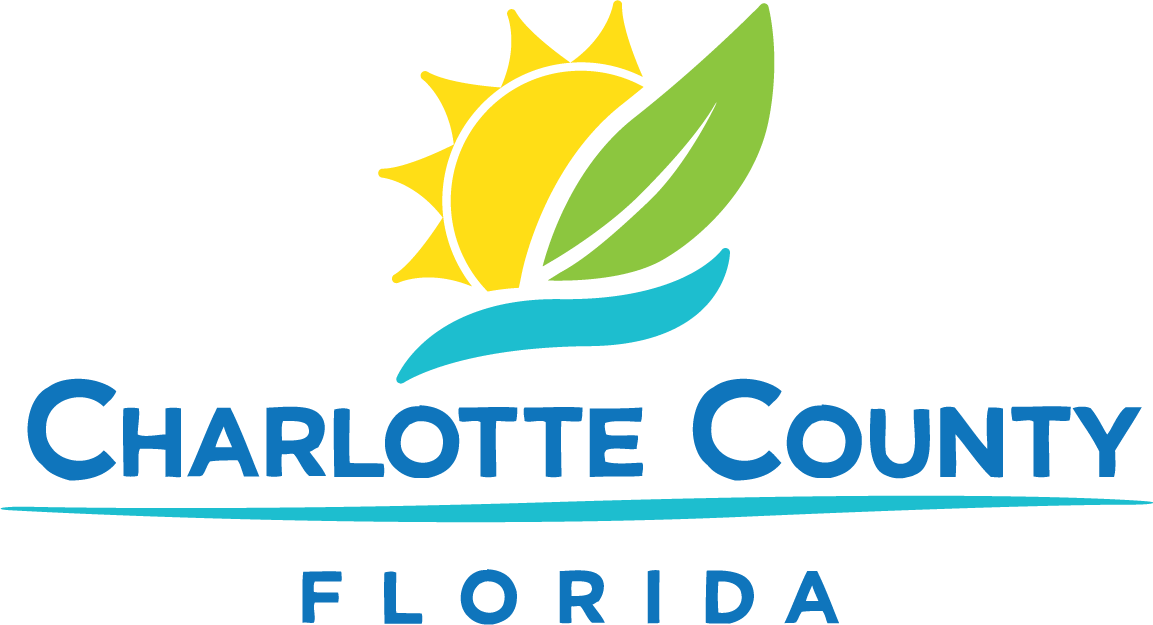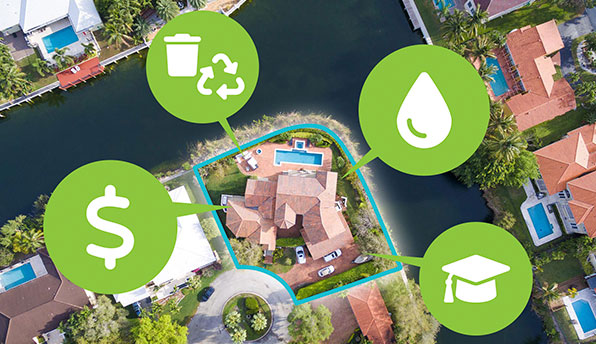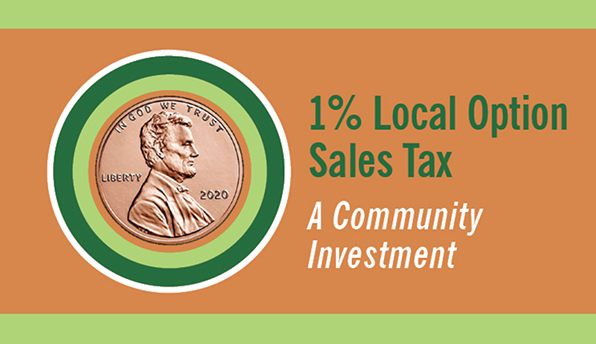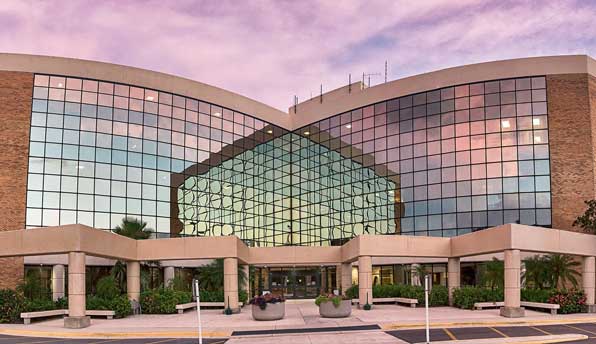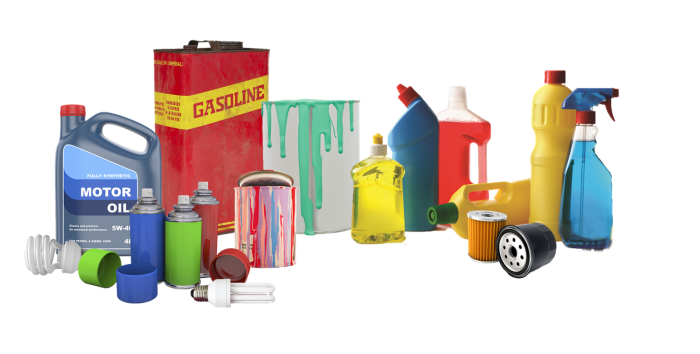
Residents can bring their household hazardous waste to the County’s Mini-Transfer and Recycling Facilities. A select few household hazardous waste items can be picked up by the residential curbside service.
Charlotte County only offers these services for residential households, businesses must hire a hazardous hauler.
Hazardous Products
A product is considered hazardous if it is corrosive, toxic, flammable, or reacts or explodes when mixed with other substances. Watch out for signal words on labels such as poison, danger, warning, and caution. Most Charlotte County homes contain three to ten gallons of these hazardous products. These include everyday items such as paint, insecticides, cleaners, automotive products and unused medications.
Improper Disposal Dangers
Hazardous products must be disposed of in the proper way to reduce environmental impact and any safety hazards. Toxic products tossed in the trash, may injure sanitation workers, damage collection vehicles, or leak into the environment. Dumping or illicit discharging household hazardous waste down the drain, on the ground, or in a stormwater drains will cause water pollution, damage plumbing, and septic systems.
Accepted Items
Mini-Transfer & Recycling Facility
Batteries: Lead-Acid batteries from cars, boats, motorcycles, and lawn mowers can be recycled at your curb, taken to a retailer, or brought to a Mini-Transfer and Recycling Facilities Rechargeable batteries (NiCad) should not be thrown in the trash. Take to a retailer or to a Mini-Transfer and Recycling Facility. Regular single use household batteries can be thrown in your trash.
Cleaners and Polishes: Use them up or give them to someone who can. Household cleaners can still be used even if they are several years old. You can also take them to a Mini-Transfer and Recycling Facility.
Cooking Oil: Charlotte County residents can dispose of used cooking oil free of charge at both Mid-County and West Charlotte Mini-Transfer and Recycling Facilities.
Gasoline, Kerosene and Diesel Fuel: Residents are encouraged to use up as an engine fuel. Strain old gasoline through a paint filter, dilute by one half with fresh gasoline and use up in your lawnmower. Another method is to take to a Mini-Transfer and Recycling Facility. Fuels are accepted in securely closed containers. It is illegal to dump any household hazardous waste into sewers, storm drains or anybody of water. See more about illegal dumping and illicit discharges.
Pesticides and Herbicides: The best way to get rid of these is to use them up according to the label directions or give it to someone who can. If this is not possible, bring to a Mini-Transfer and Recycling Facility.
Pool Chemicals: Try to use these up and be careful not to mix acid with chlorine. Keep containers tightly sealed. If necessary, bring to a Mini-Transfer and Recycling Facility.
Mercury: Please bring devices containing this toxic metal to a Mini-Transfer and Recycling Facility. Items include fluorescent light tubes, thermometers.
Paint, Strippers, Stains, and Varnishes: Usable paint can be used as a primer coat or given away. Small amounts of paint can harden by taking the lid off to dry or by mixing with kitty litter. Dried paint can be safely disposed in your regular trash, just remember to leave the lid off. If you have cannot get rid of it using the above-mentioned methods, take it to a Mini-Transfer and Recycling Facility. Try to use them up, and also try to use water-based products. If you can’t use it up, then bring it to a Mini-Transfer & Recycling Facility.
- Both County Mini-Transfer Facilities during their regular hours
- City of Punta Gorda Fire Department office in the Public Safety Building at 1410 Tamiami Trail, Punta Gorda, Monday – Friday 8 a.m. – 4:30 p.m.
This service is for residents only, businesses cannot participate. If you are unable to drive to the Mini-Transfer and Recycling Facility, call 941.764.4360. Sharps are the only biomedical waste accepted at the transfer facilities. No "red bag" waste will be accepted. Please contact your medical facility for disposal instructions for these types of bio-hazardous waste.
Curbside
Motor Oil and Used Oil Filters: Curbside motor oil/filters and non-leaking lead-acid battery collection is available on your scheduled service day. Use a transparent gallon container (milk jug type) with a screw-type lid for your oil and a clear plastic bag for your filters and place items 5 feet away from your garbage cart. Place non-leaking vehicle lead-acid battery at the curb 5 feet away from your carts as well. Many auto parts stores also take used oil.
It is illegal to dump any household hazardous waste into sewers, storm drains, or anybody of water. See more about illegal dumping and illicit discharges.
Batteries: Lead-Acid batteries from cars, boats, motorcycles, and lawnmowers can be recycled at your curb, taken to a retailer, or brought to a Mini-Transfer & Recycling Facility.
Electronics (E-Waste): Unwanted electronics, e-waste, can be picked up on your regularly scheduled service day by request only. To schedule an E-Waste pickup with pickup request form or call Waste Management at 941.629.1106 or 941.697.0012 (Englewood area) 2 days prior to your scheduled pickup day.
Small Quantity Generator (SQG) Program
Sections 403.7225 and 403.7234, Florida Statutes (F.S.) establish the Local Hazardous Waste Assessments and the Small Quantity Generator Notification and Verification Program. The SQG program is intended to educate potential generators of their legal responsibilities regarding the management of hazardous waste.
- Very Small Quantity Generator (VSQG): VSQGs generate less than 220 pounds of hazardous waste per month and less than 2.2 pounds of acute hazardous waste (such as some pesticides, toxins, or arsenic and cyanide compounds) per month.
- Small Quantity Generator (SQG): SQGs generate 220 to 2,200 pounds of hazardous waste per month.
- Large Quantity Generator (LQG): LQGs generate 2,200 pounds or more of hazardous waste per month or 2.2 pounds or more of acute hazardous waste per month.
Resources:
If you would like to discuss hazardous waste compliance call 941.764.4360 or visit Hazardous Waste Compliance and Enforcement for more information.
